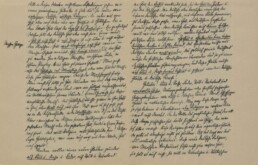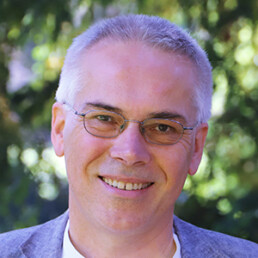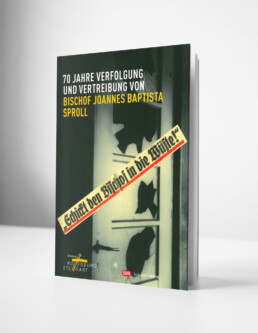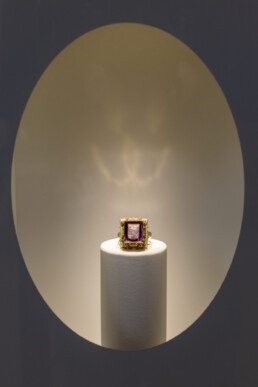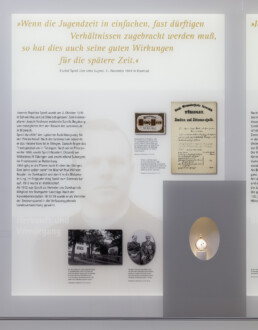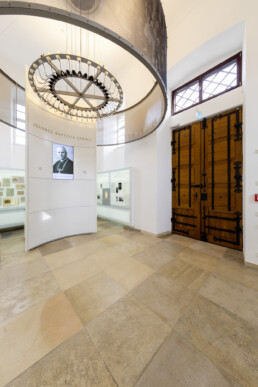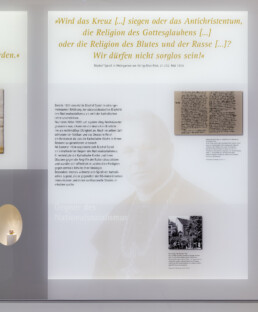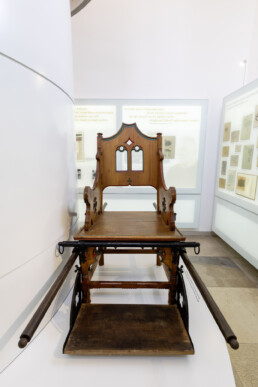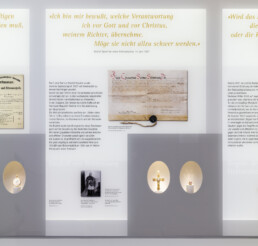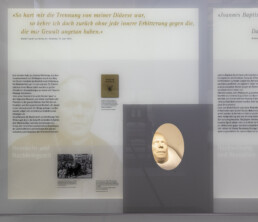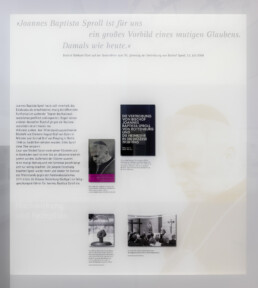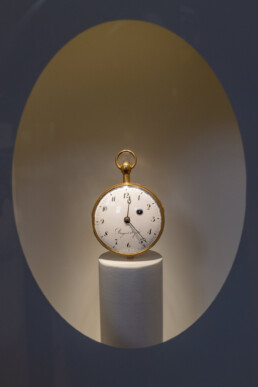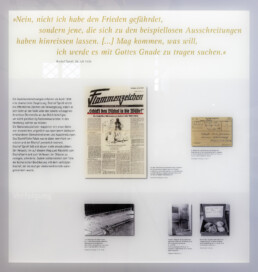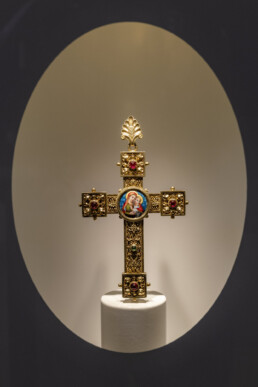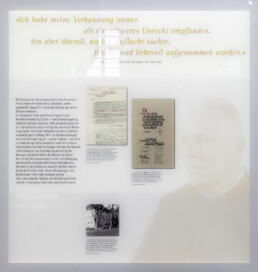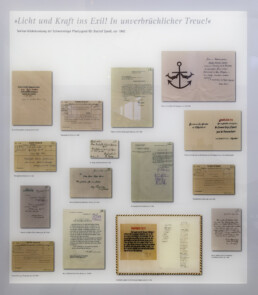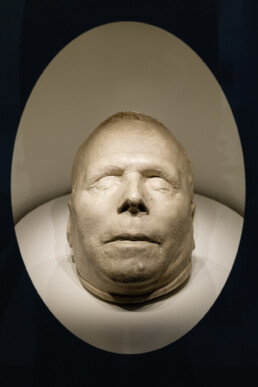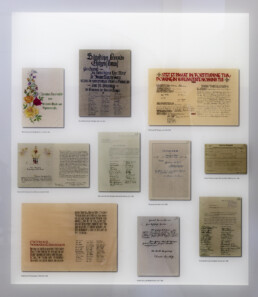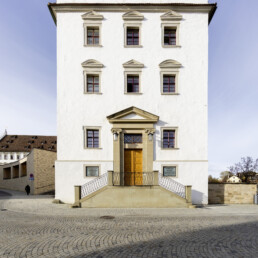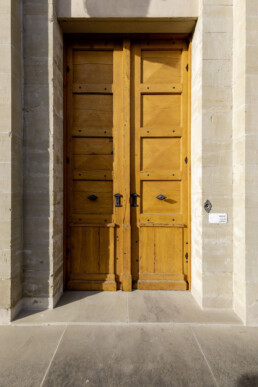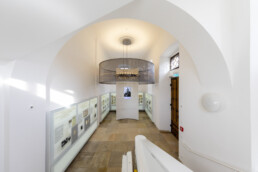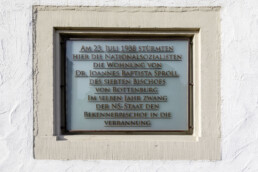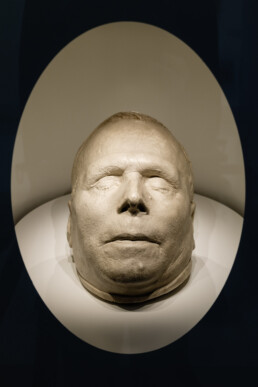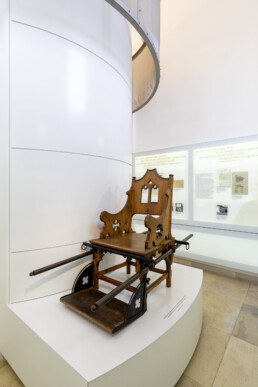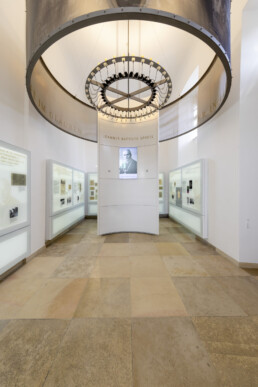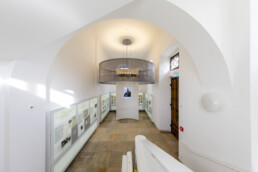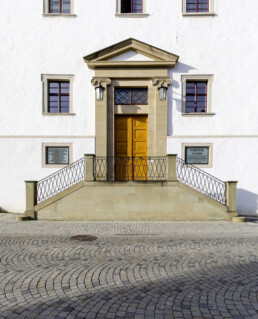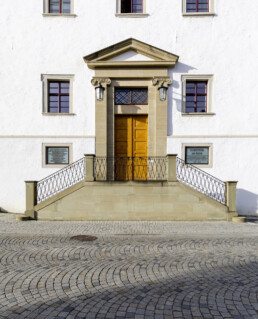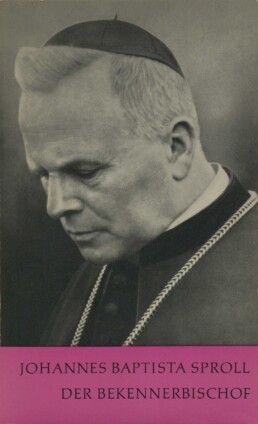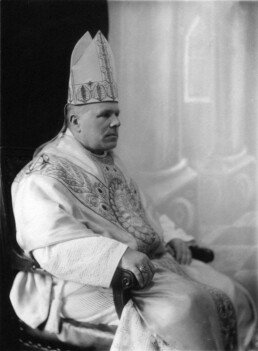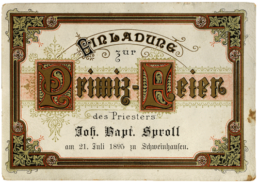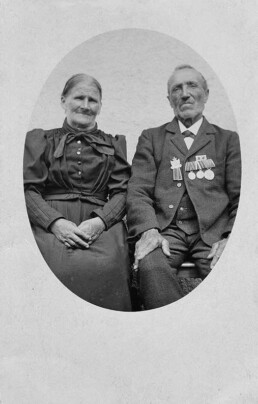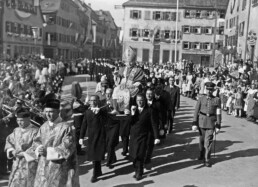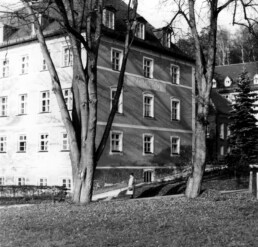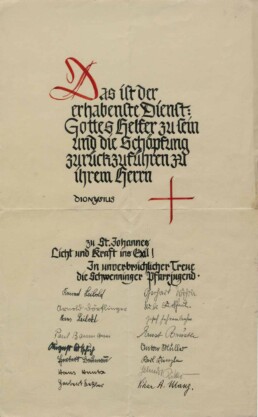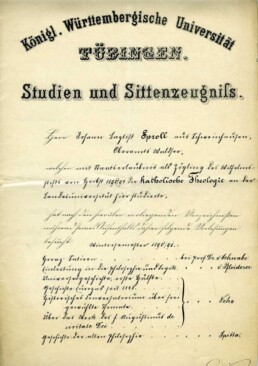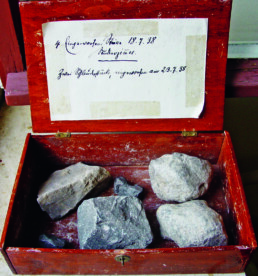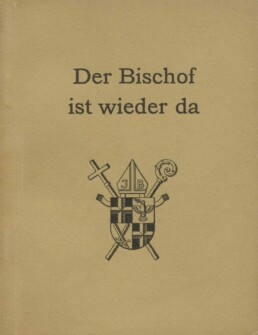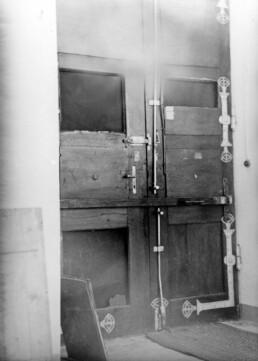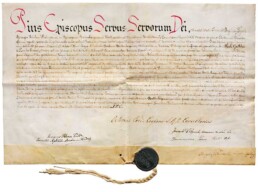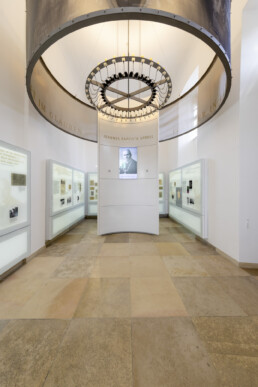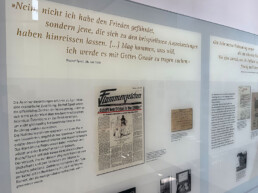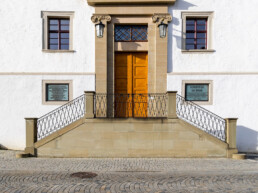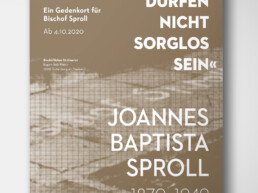Museum
Concept
In the spring and summer of 1938, after Sproll abstained from the election, National Socialist groups besieged the Palais, throwing stones through the windows and smearing inflammatory slogans on the sidewalk. For weeks there were noisy rallies in front of the palace demanding the bishop’s expulsion, dismissal or resignation. On July 23, 1938, the gate was broken open and Sproll’s apartment stormed and vandalized. The historic gate and the foyer thus themselves refer to Sproll’s persecution, which was also directly physical.
Visitors can expect a modern exploration of the stations of Sproll’s life, but also of the political context in which he moved. An impressive media presentation as well as objects and quotations make the life of the bishop and his commitment against National Socialism vivid. The presented, original expressions of loyalty by Catholics from the diocese express the solidarity of the faithful and illustrate how much the story of Bishop Sproll is the story of an entire diocese. The exhibition is also vividly designed for children, young people and school classes.
Concept: Diocesan Archives and Diocesan Museum Rottenburg
Architects: von Jacobs, exhibition design – interior design, Marina von Jacobs – Dipl.-Ing. (FH) Interior Design, Stuttgart
Completion: 2020
Team
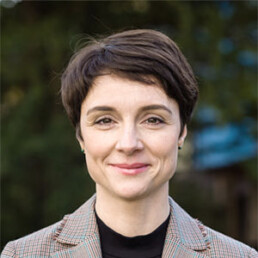
Diocesan Conservator Dr. phil. Melanie Prange
Direction
Phone: +49 (0) 7472 922-180
museum@bo.drs.de

Hildegard Weidenauer
Secretariat
Phone: 07472 922-180
hweidenauer@bo.drs.de

Oliver Göbel
Cooperation partner in the Diocesan Archives Rottenburg
Publications
Further publications
Paul Kopf, Joannes Baptista Sproll, Leben und Wirken. On the 50th anniversary of the expulsion of the Bishop of Rottenburg on August 24, 1938, Sigmaringen 1988.
Hubert Wolf, Die Affäre Sproll. The Rottenburg Bishop Election of 1926/27 and its Backgrounds, Sigmaringen 2009.
Geschichtsverein der Diözese Rottenburg-Stuttgart, Um seines Gewissens willen: Bischof Johannes Baptista Sproll zum 60. Todestag, Ostfildern 2010.
Dominik Burkard, Joannes Baptista Sproll. Bischof im Widerstand, Stuttgart 2013.
Sigrid Brüggemann, Die Verfolgung katholischer und evangelischer Geistlicher, in: Ingrid Bauz / Sigrid Brüggemann / Roland Maier (eds.), Die Geheime Staatspolizei in Württemberg und Hohenzollern, Stuttgart 2013, pp. 220-248.
Dominik Burkard, Nationalsozialismus und Zweiter Weltkrieg, in: Andreas Holzem / Wolfgang Zimmermann (eds.), Geschichte der Diözese Rottenburg-Stuttgart, vol. 2, Ostfildern 2019, pp. 148-381.
Andreas Holzem, Zusammenbruch und Aufbruch in die Moderne, in: Andreas Holzem / Wolfgang Zimmermann (eds.), Geschichte der Diözese Rottenburg-Stuttgart, vol. 2, Ostfildern 2019, pp. 384-540.
Press
Press photos for download (after enlargement save the picture with right mouse button or download all images as a ZIP-archive / 27MB).
Mediation
Guided tours
Public guided tours
Dates for public tours are yet to be published.
Registration: required
Duration: approx. 45 minutes
Entrance fee: 3,50 EUR per person (children up to 12 years free)
Meeting point: Episcopal Ordinariate, Sprollportal (opposite the “Brunnenstube”)
Individual guided tours
Guided tours for groups are available on request at the Diözesanmuseum Rottenburg.
Entrance fee: 25,- EUR per person (children up to 12 years free).
The space in the exhibition area allows only a limited number of participants of 15 persons per guided tour.
Please plan for two guided tours for larger groups.
Contact:
Diözesanmuseum Rottenburg, Mrs. Weidenauer
Karmeliterstr. 9
72108 Rottenburg
Phone: 07472 922180 /82
museum@bo.drs.de
Children and youth / daycare and school
Events for children and young people are held regularly.
You are welcome to book guided tours for children or teenagers with different thematic focuses.
Entrance fee: 2,50 EUR per person (children up to 12 years free).
Contact:
Diözesanmuseum Rottenburg, Mrs. Weidenauer
Karmeliterstr. 9
72108 Rottenburg
Phone: 07472 922180 /82
Visit
Opening times
The memorial is only accessible on a tour.
Entry prices
Public tours:
3.50 EUR per person (children up to 12 years free)
Individual tours:
25 EUR per person (children up to 12 years free)
Children and young persons‘ tours:
2.50 EUR per person (children up to 12 years free)
Public tours:
3.50 EUR per person (children up to 12 years free)
Individual tours:
25 EUR per person (children up to 12 years free)
Children and young persons‘ tours:
2.50 EUR per person (children up to 12 years free)
Around your visit
The memorial site is barrier-free with a platform lift.
Sanitary facilities are available in the building.
Eating and drinking in Rottenburg
Getting there
Episcopal Ordinariate
Eugen Bolz Platz 1
72108 Rottenburg am Neckar
Arrival by car and parking:
The Episcopal Ordinariate is located in Rottenburg’s old town, adjacent to Eugen Bolz Platz. Parking spaces are available in the surrounding multi-storey car parks (Parkhaus Rathaus, Parkhaus Museum).
Arrival by public transport:
The Rottenburg bus station is located directly on Eugen Bolz Platz in front of the Ordinariate.
Joannes Baptista Sproll
Vita
Background and career
Joannes Baptista Sproll was born on October 2nd 1870, in Schweinhausen near Biberach, and grew up in simple, rural circumstances. His home pastor discovered his talent and made it possible for him to attend the Latin school. After studying theology in Tübingen and being ordained a priest, Sproll became a teacher at the Tübingen Wilhelmsstift, then Subregens at the Rottenburg seminary.
In 1909 Sproll went to Kirchen as a pastor, before Bishop Paul Wilhelm Keppler appointed him to the cathedral chapter three years later. In the following year Sproll became vicar general, and in 1916 auxiliary bishop. From 1912, he sat as a representative of the cathedral chapter in the Stuttgart state parliament. In 1919 he was elected as a representative of the Center Party in the state constitutional assembly. After the death of Bishop Keppler, the cathedral chapter chose Sproll as his successor in 1927 – and in difficult times: the global economic crisis at the end of the 1920’s led to a strengthening of extremist parties, the Communists and the National Socialists. With his popularity, common touch and open character, Sproll relied entirely on preserving traditional beliefs in the face of these tendencies.
Opponent of National Socialism and persecution
As early as 1931, in a declaration by the southwest German bishops, Bishop Sproll condemned National Socialism as “incompatible with Catholic teaching”. After Hitler had legally become Chancellor in 1933, the German bishops recognized him as a legitimate authority.
From the summer of 1934, Sproll exposed himself as a staunch opponent of National Socialism. In sermons he publicly spoke out against the central content of Nazi ideology, against the idolatry of race and blood, and German-ethnic tendencies. From April 1938 onwards, the conflict escalated dramatically. Bishop Sproll set a public sign of refusal by not taking part in the election on the annexation of Austria to the Reich, which had already taken place, in order not to have to elect National Socialists to the Reichstag at the same time. The National Socialists reacted with a wave of staged demonstrations and riots allegedly resulting from spontaneous popular anger.
Banishment and exile
The attempts by the National Socialists to persuade Sproll to resign from office “voluntarily” failed: he was not intimidated by the riots. In addition, sections of the Catholic population expressed their solidarity with the persecuted clergyman, who was perceived as a courageous “confessing bishop”. Eventually however the bishop was banished from his diocese. In September 1938, Sproll found refuge in the Benedictine abbey of St. Ottilien in the diocese of Augsburg. Due to the deterioration in his health, he moved to the Krumbad spa in early 1941.
Sproll also held his office as Rottenburg diocesan bishop in exile, as far as possible. He wrote pastoral letters and stayed in contact with the cathedral chapter. In 1943 he carried out the consecration of the diocese to Mary from his exile in Krumbad, which met with a great response.
Homecoming and death
Only with the end of World War II and the collapse of the Nazi regime was the way made clear for the bishop’s return. Thousands of believers attended the return celebration on June 14, 1945 and his 50th anniversary as a priest. Despite his illness, Sproll visited many parishes throughout the diocese in the following years. The image of the bishop, marked by illness and exile, who had to be carried through the crowd in a chair because of his paralysis, was imprinted on the collective memory.
Sproll emphasized the readiness for reconciliation. His work was focused on future-oriented tasks, reconstruction after the destruction, Christian charitable engagement with economic and spiritual hardship, and the integration of the displaced. He died on March 4, 1949.
Aftermath and reception
Joannes Baptista Sproll distinguished himself as a determined opponent of National Socialism, who courageously went out on a limb by seeking public confrontation.
The National Socialists did not take such significant action against any other German bishop. While other bishops, such as the Münster bishop von Galen, or the Berlin bishop von Preysing, were elevated to cardinals in 1946, Sproll was denied this honor. However the Rottenburg bishop was indeed honored as a ‘confessor’ after his return and in obituaries after his death. Outside the diocese, however, his courageous demeanor and fate received little attention for a long time.
More recent research is paying more and more attention to Sproll in the context of resistance to National Socialism. In 2011, the Diocese of Rottenburg initiated a beatification process for him.
Welcome to the Sproll memorial site
The memorial is part of the present Episcopal Ordinariate in Rottenburg. Historically, it is the foyer of the Episcopal Palace, the place of residence and work of the Rottenburg bishops. In the spring and summer of 1938, after Sproll abstained from voting, National Socialist groups besieged the palace, threw stones through the windows and daubed inflammatory slogans on the sidewalk. For weeks there were loud rallies in front of the palace demanding the expulsion, recall or resignation of the bishop.
On July 23, 1938, the gate was broken through and Sproll’s apartment was stormed and devastated. The historical gate and the foyer themselves refer to the – also directly physical – persecution of Sproll.
